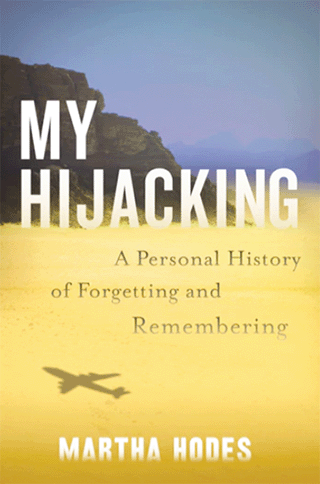Reviewed by NEAL GENDLER
Martha Hodes wanted to know what it was like to be 12 years old, traveling with a sister on an international flight that’s hijacked.
Hodes was that girl, but her preoccupation during six sweltering days and frigid nights in a parked airliner, the passage of decades and her deliberate repression had made her memories scanty and disconnected. She had trouble relating to having been there.
“We ended up as hostages in the Jordan desert,” writes Hodes, an author and history professor at New York University. She and her sister Catherine, almost 14, were traveling from their mother in Tel Aviv to their father in New York. They and passengers aboard two other hijacked airliners were held against a demand for release of imprisoned terrorists.

“None of us hostages yet knew that we were part of the biggest hijacking operation the world had ever seen.”
My Hijacking is Hodes’ account as she remembered, researched and reconstructed it. She wanted to understand why she’d tried to act as if it was of no importance and how its repression affected her life beyond a continuing unease about flying.
Much more interesting than I’d expected, My Hijacking is well and clearly written, though jumping back and forth in time. Throughout are quotations from The Little Prince, Hodes’ favorite book that summer.
She’s not unsympathetic to her captors’ sentiments and avoids calling them terrorists — a fitting term — but more neutrally “hijackers” or, inaccurately, “commandos.” No. Commandos are small military units for quick raids, sometimes to free hostages.
The deadly 9/11 hijackings prompted her to consider her experience.
“That’s when I realized how little I remembered,” she says. “I wanted to connect to the 12-year-old girl who buried as much as she could. … I wanted to do more than excavate my own memories.”
The Popular Front for the Liberation of Palestine’s four-airliner hijacking, on Sunday, Sept. 6, 1970, was world-grabbing news. Commandeered were her TWA flight (after Frankfurt) and airliners from Swissair, Pan Am and El Al — the last foiled when the pilot suddenly dropped altitude, toppling terrorist Leila Khaled to the floor where passengers subdued her. A guard shot the other hijacker dead. The Pan Am was hijacked to Cairo and destroyed.
On Sept. 9, a BOAC airliner was hijacked to the abandoned airstrip where TWA 741 and Swissair were parked, making about 400 hostages. On their aircraft, the sisters counted seven infants, 15 toddlers and a girl, six, alone.
PFLP members pointed rifles at them but usually were polite, saying they would not be harmed. Some were taken for interrogation. Luggage was opened and anything suspected of coming from Israel was removed.
They were fed varied amounts by the PFLP, then better by the Red Cross, which provided physicians augmenting a PFLP doctor.
But they sat sweating and unbathed amid increasing litter with a reeking, overflowed toilet, eventually eased when a flight engineer opened a drain valve.
Passengers suffered discomfort, dirt, odor, hunger and thirst, but not physical abuse. The PFLP installed explosives, threatening to set them off unless nations met their demands.
At one point the hijackers ordered everyone off the airplane and drove some of them away, leaving the rest in a circle surrounded by armed terrorists.
Catherine said she expected they would all be killed.
But they were ordered back inside, wives frightened for missing husbands, and Sara Raab left with two children but not David, her oldest. He was one of 56 people unaccounted for when most of the hostages were released and flown out. Eventually, all would be freed, at the cost of exploded aircraft and released terrorists.
“After we came home, there was no debriefing by authorities,” Hodes says “No teacher sent us to a school guidance counselor, and no one took us to a therapist. Our parents never told us what it was like for them,” dismissing her feelings of the hijacking “as an experience best ignored.”
Her best friend “wanted to know everything, but I didn’t want to talk about it.”
Her parents, minimally observant Jews, were theatrical dancers, acclaimed mother Linda with Martha Graham and Israel’s Batsheva Dance Company, which attracted her to remain in Israel. The daughters lived with their father Stuart during the school year, with their mother in summers.
Her parents’ reticence about their split made it “easiest to dismiss the uncomfortable emotions that none of us wanted to acknowledge anyway,” Hodes said. “By the time I boarded the flight home, … I was adept at banishing uncomfortable feelings.”
How did the hostages pass all that time? They talked, played games, bickered, sang — with modifications such as “I’m living on a jet plane” — and slept, perhaps for a reason we discover late in the book that might have dimmed memory: The Red Cross physicians freely distributed tranquilizers. She doesn’t remember if she and Catherine took them.
For the book, she augmented her memory at the National Archives: newspaper accounts, TWA records, flight crew reports and TV news footage. She interviewed other hostages and used British and Swiss archives. She discovered things she’d forgotten, things she’d not known and photos showing her and Catherine.
But “all these years later,” she says, “I’m still unable to recapture a real memory of fear.”
***
Neal Gendler is a Minneapolis writer and editor.
(American Jewish World, July 2023)




















